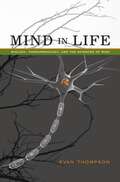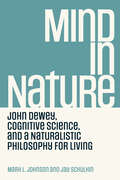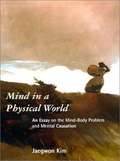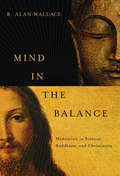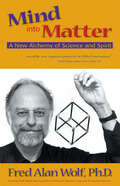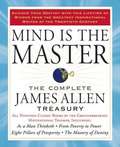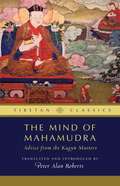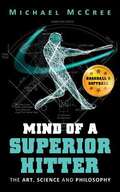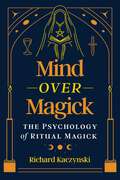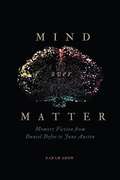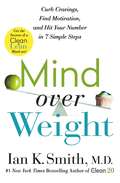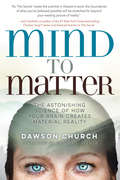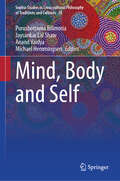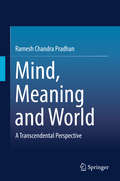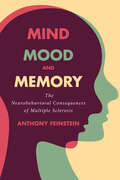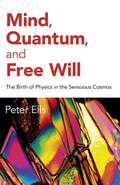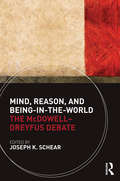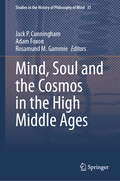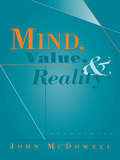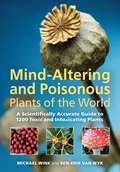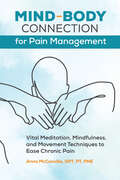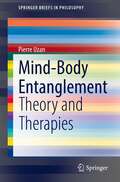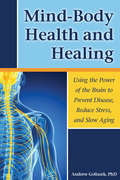- Table View
- List View
Mind in Life: Biology, Phenomenology, and the Sciences of Mind
by Evan ThompsonHow is life related to the mind? Thompson explores this so-called explanatory gap between biological life and consciousness, drawing on sources as diverse as molecular biology, evolutionary theory, artificial life, complex systems theory, neuroscience, psychology, Continental Phenomenology, and analytic philosophy. Ultimately he shows that mind and life are more continuous than previously accepted, and that current explanations do not adequately address the myriad facets of the biology and phenomenology of mind.
Mind in Nature: John Dewey, Cognitive Science, and a Naturalistic Philosophy for Living
by Jay Schulkin Mark L. JohnsonA dialogue between contemporary neuroscience and John Dewey&’s seminal philosophical work Experience and Nature, exploring how the bodily roots of human meaning, selfhood, and values provide wisdom for living.The intersection of cognitive science and pragmatist philosophy reveals the bodily basis of human meaning, thought, selfhood, and values. John Dewey's revolutionary account of pragmatist philosophy Experience and Nature (1925) explores humans as complex social animals, developing through ongoing engagement with their physical, interpersonal, and cultural environments. Drawing on recent research in biology and neuroscience that supports, extends, and, on occasion, reformulates some of Dewey's seminal insights, embodied cognition expert Mark L. Johnson and behavioral neuroscientist Jay Schulkin develop the most expansive intertwining of Dewey's philosophy with biology and neuroscience to date.The result is a positive, life-affirming understanding of how our evolutionary and individual development shapes who we are, what we can know, where our deepest values come from, and how we can cultivate wisdom for a meaningful and intelligent life.
Mind in a Physical World: An Essay on the Mind-Body Problem and Mental Causation
by Jaegwon KimKim construes the mind-body problem as that of finding a place for the mind in a world that is fundamentally physical. Among other points, he redefines the roles of supervenience and emergence in the discussion of the mind-body problem.
Mind in the Balance
by B. Alan WallaceBy establishing a dialogue in which the meditative practices of Buddhism and Christianity speak to the theories of modern philosophy and science, B. Alan Wallace reveals the theoretical similarities underlying these disparate disciplines and their unified approach to making sense of the objective world. Wallace begins by exploring the relationship between Christian and Buddhist meditative practices. He outlines a sequence of meditations the reader can undertake, showing that, though Buddhism and Christianity differ in their belief systems, their methods of cognitive inquiry provide similar insight into the nature and origins of consciousness. From this convergence Wallace then connects the approaches of contemporary cognitive science, quantum mechanics, and the philosophy of the mind. He links Buddhist and Christian views to the provocative philosophical theories of Hilary Putnam, Charles Taylor, and Bas van Fraassen, and he seamlessly incorporates the work of such physicists as Anton Zeilinger, John Wheeler, and Stephen Hawking. Combining a concrete analysis of conceptions of consciousness with a guide to cultivating mindfulness and profound contemplative practice, Wallace takes the scientific and intellectual mapping of the mind in exciting new directions.
Mind into Matter: A New Alchemy of Science and Spirit
by Fred Alan WolfA physicist examines ideas from medieval alchemy and contemporary science to explore the connection between mind and matter.Alchemists of old attempted to make sense of the universe—to discover the connection between mind and matter. Some of today’s scientists, in particular quantum physicists, are doing the same. In this contribution to the study of consciousness, physicist Fred Alan Wolf reveals what he calls the “new alchemy” —a melding of the ideas of the old alchemists and the new scientists to reach a fuller understanding of mind and matter.An elegant book with short, stand-alone chapters, each framed by an alchemical symbol and its definition, Mind into Matter is thought provoking for scientists and lay people alike.Praise for Mind into Matter“I consider Fred Alan Wolf one of the most important pioneers in the field of consciousness. This book could change the way you perceive the world.” —Deepak Chopra, MD, FACP, author of How to Know God“Once again, physicist Fred Alan Wolf takes us on a magical mystery tour into the adventure land of science and spirit. . . . Both enthralling and energizing.” —Michael Toms, cofounder, host, producer of New Dimensions Radio“How refreshing to have a scientist put the emphasis on the individual where it belongs! Wolf has written a glorious entertainment for the mind that matters.” —Kenneth Ring, PhD, author of Lessons from the Light“[A]llows readers to look at their own inner mechanism and better understand the consciousness which gives them life and makes them aware of the outer world of forms and phenomena in which they live.” —Glen P. Kezwer, Ph.D., physicist, author of Meditation, Oneness and Physics
Mind is the Master: The Complete James Allen Treasury
by James AllenThe classic books of the motivational visionary, collected for the first time in a single volume. Featuring nineteen beloved works, including As a Man Thinketh, Eight Pillars of Prosperity, The Mastery of Destiny, and From Poverty to Power, here is the first-ever comprehensive and definitive collection of the books of self-help pioneer James Allen. Formatted in a large, easy-to-read workbook size, with fully redesigned and reset text, Mind Is the Master provides a lifetime's worth of wisdom and guidance from one of history's leading voices of self- affirming and motivational philosophy. Mind Is the Master compiles Allen's most celebrated books, along with little-known gems and posthumous works-such as Foundation Stones to Happiness and Success and Light on Life's Difficulties-awaiting discovery by a whole new generation of readers. As a special bonus, Mind Is the Master includes a rare remembrance of James Allen by his wife and intellectual partner, Lily Allen. It is an invaluable window on the life and inner world of a writer whose insights touched millions of readers.
Mind of Mahamudra
by Thupten Jinpa Peter Alan RobertsEnjoy six key texts on the cornerstone meditation practice of the Kagyu school of Tibetan Buddhism by some of its most celebrated forebearers.This third volume in the Tibetan Classics series highlights mahamudra, the central meditation practice of the Kagyu school of Tibetan Buddhism. The six texts range in date from the twelfth to the seventeenth century and include such celebrated authors as Lama Shang and the Third Karmapa. Mahamudra is essentially a simple, direct method for looking beyond our thoughts to the very nature of conscious experience. Mahamudra literally means "the great seal" and masters of this tradition have explained it to mean that everything is sealed with buddhahood, and there is no liberation to be attained other than what is already present. Mahamudra, it is said, is not attained not because it is too difficult, but because it is too easy; not because it is too far, but because it is too close; and not because it is hidden but because it is too evident. Because of its universality and directness, mahamudra meditation is particularly suited to the modern West. Eminent scholar Peter Alan Roberts draws on his thirty-plus years of experience of translating for Tibetan lamas to illuminate these benchmark translations.
Mind of a Superior Hitter: The Art, Science and Philosophy
by Michael McCreeThis book takes an in-depth look into the key aspects of becoming a great hitter from a psychological, emotional and strategic perspective. It is designed to enhance the intelligence of hitters in both baseball and softball on a level that is unprecedented. It also includes quotes and advice from some of the top hitting coaches in the world, former professional players and prominent minds that have contributed to today's leading hitting ideologies. Throughout, players and coaches are provided valuable information on what it takes to become a better all-around hitter.
Mind over Magick: The Psychology of Ritual Magick
by Richard Kaczynski• Draws on peer-reviewed research in psychology and cognitive neuroscience, such as real-time brain imaging, to examine the effects of mystical states and magical practice• Shows how being &“in the zone,&” as described by athletes and performers, is consistent with the ritualist&’s state of mind when working magic• Suggests rituals and routines to strengthen one&’s practice of magic, witchcraft, meditation, and yoga with empirically proven toolsBy looking through the lens of psychology, cognitive neuroscience, and real-time brain imaging, Mind over Magick shows how and why ritual magical practice can produce profound experiences with tangible benefits.Richard Kaczynski draws on a wealth of peer-reviewed research to shed new light on magic. He uses psychological studies, including the infamous Stanford Prison Experiment in which subjects role-played as prisoners and guards, to reveal the power of magical vestments and personas and the effects they have on ritual practitioners. He shows how being &“in the zone,&” as described by athletes and performers, is consistent with the ritualist&’s state of mind when working magic. He also reveals what neurological processes are involved when one encounters and works with spirits.Mind over Magick includes empirically proven rituals to strengthen one&’s practice of magic, witchcraft, yoga, and meditation. Readers can then apply the scientific method to evaluate their own spiritual praxis and determine what works best for them. For solitary practitioners and group participants alike, the author shares what happens, both on a psychological and neurological level, when they enter sacred spaces and use ritual implements as well as enter deep meditative states. He also details the importance of initiation as a rite of passage and transformative method of instruction.By approaching the art of practicing magic as a science, readers are encouraged to hone a more effective and empirically grounded practice.
Mind over Matter: Memory Fiction from Daniel Defoe to Jane Austen
by Sarah EronHow do we understand memory in the early novel? Departing from traditional empiricist conceptualizations of remembering, Mind over Matter uncovers a social model of memory in Enlightenment fiction that is fluid and evolving—one that has the capacity to alter personal histories. Memories are not merely imprints of first-hand experience stored in the mind, but composite stories transacted through dialogue and reading.Through new readings of works by Daniel Defoe, Frances Burney, Laurence Sterne, Jane Austen, and others, Sarah Eron tracks the fictional qualities of memory as a force that, much like the Romantic imagination, transposes time and alters forms. From Crusoe’s island and Toby’s bowling green to Evelina’s garden and Fanny’s east room, memory can alter, reconstitute, and even overcome the conditions of the physical environment. Memory shapes the process and outcome of the novel’s imaginative world-making, drafting new realities to better endure trauma and crises. Bringing together philosophy of mind, formalism, and narrative theory, Eron highlights how eighteenth-century novelists explored remembering as a creative and curative force for literary characters and readers alike. If memory is where we fictionalize reality, fiction—and especially the novel—is where the truths of memory can be found.
Mind over Weight: Curb Cravings, Find Motivation, and Hit Your Number in 7 Simple Steps
by Ian K. SmithA motivational guide to losing weight and maintaining success by the #1 New York Times bestselling author of Clean & LeanEvery day of every year, thousands of people start some type of weight loss/transformation journey. Mind over Weight is an important weapon to add to their arsenals.While eating the right food and exercising is critical to weight loss success, Mind over Weight helps readers win the battle by getting everything in order above the neck. It will guide readers to find their motivation, stick to a plan, and set the right goals.There are a million diet plans out there, but few address issues equally critical to weight loss success: they're all in the six inches between your ears!Written by Ian K. Smith, MD, bestselling author of SHRED and The Clean 20, Mind over Weight is an easy read with concrete steps dieters will be able to follow. Each chapter ends with a takeaway action item for readers to complete to help create an overall strategy for body and life transformation.
Mind to Matter: The Astonishing Science of How Your Brain Creates Material Reality
by Dawson Church&“As &‘The Secret&’ meets the scientist in Dawson&’s work, the boundaries of what you&’ve believed possible will be stretched far beyond your existing picture of reality.&” — Jack Canfield, co-author of the #1 New York Times bestselling Chicken Soup® series and featured teacher in The SecretBest Health Book of 2018 - American Book Fest.Best Science Books of 2018 - Bookbub.Every creation begins as a thought, from a symphony to a marriage to an ice cream cone to a rocket launch. When we have an intention, a complex chain of events begins in our brains. Thoughts travel as electrical impulses along neural pathways. When neurons fire together they wire together, creating electromagnetic fields. These fields are invisible energy, yet they influence the molecules of matter around us the way a magnet organizes iron filings.In Mind to Matter, award-winning researcher Dawson Church explains the science showing how our minds create matter. Different intentions produce different fields and different material creations. The thoughts and energy fields we cultivate in our minds condition the atoms and molecules around us. We can now trace the science behind each link in chain from thought to thing, showing the surprising ways in which our intentions create the material world. The science in the book is illustrated by many authentic case histories of people who harnessed the extraordinary power of the mind to create. They include:• Adeline, whose Stage 4 cancer disappeared after she imagined "healing stars" • Raymond Aaron and two of his clients, each of whom manifested $1 million in the same week • Elon Musk, who bounced back from devastating tragedy to found Tesla and SpaceX • Graham Phillips, who grew the emotional regulation part of his brain by 22.8% in two months • Jennifer Graf, whose grandfather&’s long-dead radio came to life to play love songs the day of her wedding • Harold, whose 80% hearing loss reversed in an hour • Joe Marana, whose deceased sister comforted him from beyond the grave • Rick Geggie, whose clogged arteries cleared up the night before cardiac surgery • Matthias Rust, a teen whose "airplane flight for peace" changed the fate of superpowers • Wanda Burch, whose dream about cancer told the surgeon exactly where to look for it • An MIT freshman student who can precipitate sodium crystals with his mind • John, who found himself floating out of his body and returned to find his AIDS healed • Dean, whose cortisol levels dropped by 48% in a single hourIn Mind to Matter, Dawson Church shows that these outcomes aren&’t a lucky accident only a few people experience. Neuroscientists have measured a specific brain wave formula that is linked to manifestation. This "flow state" can be learned and applied by anyone. New discoveries in epigenetics, neuroscience, electromagnetism, psychology, vibration, and quantum physics connect each step in the process by which mind creates matter. They show that the whole universe is self-organizing, and when our minds are in a state of flow, they coordinate with nature's emergent intelligence to produce synchronous outcomes. The book contained over 150 photos and illustrations that explain the process, while an "Extended Play" section at the end of each chapter provides additional resources. As Mind to Matter drops each piece of the scientific puzzle into place, it leaves us with a profound understanding of the enormous creative potential of our minds. It also gives us a road map to cultivating these remarkable brain states in our daily lives.
Mind, Body and Self (Sophia Studies in Cross-cultural Philosophy of Traditions and Cultures #38)
by Purushottama Bilimoria Michael Hemmingsen Jaysankar Lal Shaw Anand VaidyaThis book is a unique collaboration of philosophers from across the world bringing together contemporary concepts of consciousness, the Māori conception of self, as well as Indian and Buddhist concepts of self and mental states. Contemporary concepts of consciousness include higher-order consciousness and phenomenological approaches. The idea behind this volume came from an international conference on ‘Mind, Body and Self’ held at Victoria University of Wellington; organized by the Society for Philosophy and Culture. The authors herein contribute to the relationship between concepts of self, mind, and body. The wide variety of contributors from across cultural backgrounds adds to a diverse and valuable conversation on the nature of human existence and thoughts of self. This book appeals to students and researchers working in philosophy and religious studies.
Mind, Character and Personality (Christian Home Library #Volume 1)
by Ellen G. WhiteIn Ellen G. White's lifetime (1827-1915) psychology, the science that treats of the mind and its powers and functions, was in its infancy. Yet there emerges throughout her writings a distinctive philosophy in which guidelines in this science and to mental health are clearly portrayed. The purpose of this compilation is to bring together for convenient study the Ellen G. White statements in this broad, important, and sometimes controversial field. Seventh-day Adventists, and others with their conviction that the author wrote under the influence of the Spirit of God, treasure guidance in a field so vital to all humanity at a time when schools of psychological thought are varied and changing. The soundness of author's views in the areas of physiology, nutrition, and education, as well as in other fields, has been well demonstrated.
Mind, Character and Personality (Christian Home Library #Volume 2)
by Ellen G. WhiteA large portion of this book presents general guiding principles. This is interspersed and supplemented with materials setting forth practical admonitions and counsels in the setting of the relationship of the teacher and the student, the minister and the parishioner, the physician and the patient, or the parent and the child. The counsels in scores of instances addressed to an executive, minister, physician, teacher, editor, husband, homemaker, or youth may, in their revelation or circumstances and advice given, partake somewhat of the form of case histories. Attention should be directed to the principles involved. The book is somewhat encyclopedic. Each quotation carries a specific credit to its source in the Ellen G. White materials, making it possible for the reader in many cases to turn to the full original context.
Mind, Meaning and World: A Transcendental Perspective
by Ramesh Chandra PradhanThe present book intends to approach the problem of mind, meaning and consciousness from a non-naturalist or transcendental point of view. The naturalization of consciousness has reached a dead-end. There can be no proper solution to the problem of mind within the naturalist framework. This work intends to reverse this trend and bring back the long neglected transcendental theory laid down by Kant and Husserl in the West and Vedanta and Buddhism in India. The novelty of this approach lies in how we can make an autonomous space for mind and meaning without denying its connection with the world. The transcendental theory does not disown the embodied nature of consciousness, but goes beyond the body in search of higher meanings and values. The scope of this work extends from mind and consciousness to the world and brings the world into the space of mind and meaning with a hope to enchant the world. The world needs to be retrieved from the stranglehold of scientism and naturalism. This book will dispel the illusion about naturalism which has gripped the minds of our generation. The researchers interested in the philosophy of mind and consciousness can benefit from this work.
Mind, Mood, and Memory: The Neurobehavioral Consequences of Multiple Sclerosis
by Anthony FeinsteinA unique resource for all health care practitioners caring for people with multiple sclerosis.Endorsed by The Consortium of Multiple Sclerosis CentersMultiple sclerosis (MS), a progressive neurologic disease, is characterized by a host of physical symptoms. But the neurobehavioral consequences of MS can be as devastating and debilitating as physical symptoms, and they are often unreported and undertreated. In this new book, Dr. Anthony Feinstein, a neuropsychiatrist, documents the effects of MS on cognition, information processing speed, learning and memory, executive function, personality, mood, and behavior.Feinstein touches on a number of topics, including• the common cognitive challenges that occur with MS, such as slowed information processing speed, impaired memory, and executive function deficits • psychiatric disorders that accompany MS, such as depression and psychosis• current neuropsychological, brain MRI, and treatment data applicable to the psychiatric and cognitive disordersMind, Mood, and Memory in Multiple Sclerosis is enhanced both by the latest science and by eloquent case histories that illustrate each cognitive and emotional disorder. Feinstein also provides recommendations for evidence-based therapeutic interventions. Written in an immediate, accessible way, this book has a crossover appeal, making it of interest not only to neurologists, psychiatrists, neuropsychiatrists, neuropsychologists, psychologists, occupational therapists, and nurses but also to people with MS and their caregivers, family, and friends.
Mind, Quantum, and Free Will: The Birth of Physics in the Sensuous Cosmos
by Peter EllsThe mind-body problem is the ultimate intractable enigma. How can we - being complex physical systems - have multicoloured experiences, and make conscious choices? This book proposes that all fundamental constituents of the universe are agents, which perceive one another, and freely act according to their percepts. Contemporary science can be explained in entirely mentalistic terms. This is consistent with many interpretations of quantum mechanics, such as GRW and Roger Penrose's OR theory.
Mind, Reason, and Being-in-the-World: The McDowell-Dreyfus Debate
by Joseph K. SchearJohn McDowell and Hubert L. Dreyfus are philosophers of world renown, whose work has decisively shaped the fields of analytic philosophy and phenomenology respectively. Mind, Reason, and Being-in-the-World: The McDowell-Dreyfus Debate opens with their debate over one of the most important and controversial subjects of philosophy: is human experience pervaded by conceptual rationality, or does experience mark the limits of reason? Is all intelligibility rational, or is there a form of intelligibility at work in our skilful bodily rapport with the world that eludes our intellectual capacities? McDowell and Dreyfus provide a fascinating insight into some fundamental differences between analytic philosophy and phenomenology, as well as areas where they may have something in common. Fifteen specially commissioned chapters by distinguished international contributors enrich the debate inaugurated by McDowell and Dreyfus, taking it in a number of different and important directions. Fundamental philosophical problems discussed include: the embodied mind, subjectivity and self-consciousness, intentionality, rationality, practical skills, human agency, and the history of philosophy from Kant to Hegel to Heidegger to Merleau-Ponty. With the addition of these outstanding contributions, Mind, Reason, and Being-in-the-World is essential reading for students and scholars of analytic philosophy and phenomenology.
Mind, Soul and the Cosmos in the High Middle Ages (Studies in the History of Philosophy of Mind #31)
by Jack P. Cunningham Adam Foxon Rosamund M. GammieThis is a unique volume in which a critical introduction and multiple chapters offer a wide-ranging discussion of medieval conceptions of the nature of humankind, its relationship with the universe, and the processes of thinking by which both are conceptualized. Concentrating on the centuries spanning the High Middle Ages, chapters include in-depth analyses of such ideas as the habit as the ultimate dwelling place of the soul, the Soul of the Universe and its relation to humanity, and the Agent Intellect’s part in the functions of the mind regarding abstraction and intuition. This book explores how metaphysical Intelligences interact with our movements, how the desires of our minds affect the acquisition of knowledge, as well as asking how and why analysis of the makeup of animal souls took place. The High Middle Ages was a crucially important epoch in the history of intellectual endeavor. This volume appeals to students and researchers; it discusses and evaluates the contributions on the subjects of mind, soul, and the cosmos of some of the finest Christian, Jewish, and Moslem intellects in the twelfth and thirteenth centuries. Theologians, philosophers, and cosmologists include Aquinas, Grosseteste, Avicenna, Gersonides, Buridan, the School of Chartres, as well as many others. The overarching theme of this collection of essays is that vitally new conceptions of what it meant to be a rational Human, the purpose of thought in relation to the journey of the soul, and the metaphysical character of our universe contributed enormously to the paradigm-shifting nature of this age.
Mind, Value, and Reality
by John McDowellThis volume collects some of John McDowell's influential papers, written at various times over the last two decades. One group of essays deals mainly with issues in the interpretation of the ethical writings of Aristotle and Plato. A second group of papers contains more direct treatments of questions in moral philosophy that arise naturally out of reflection on the Greek tradition. Some of the essays in the second group exploit Wittgensteinian ideas about reason in action, and they open into the third group of papers, which contains readings of central elements in Wittgenstein's difficult later work. A fourth group deals with issues in the philosophy of mind and with questions about personal identity and the special character of first-personal thought and speech.
Mind-Altering and Poisonous Plants of the World
by Michael Wink Ben-Erik van WykThe book is meant for gardeners, pharmacists, doctors or members of Poison Centres to identify and learn about more than 1200 poisonous and mind-altering plants and to be able to help in case of poisoning and intoxication.
Mind-Body Connection for Pain Management: Vital Meditation, Mindfulness, and Movement Techniques to Ease Chronic Pain
by Anna McConville DPT, PT, PNETap in to the power of the mind body connection to manage pain The mind body connection is a holistic approach to healing that addresses how your thoughts, feelings, and attitude can positively impact your body. Mind Body Connection for Pain Management shows you how to integrate this approach into your life, with step-by-step exercises that help you use the power of your mind to relieve all types of pain. Change how you perceive your well-being with a wide range of strategies that let you feel, breathe, and move in new ways. Mind Body Connection for Pain Management features: Psychology-based solutions—Explore techniques rooted in Cognitive Behavioral Therapy, mindfulness, meditation, breathwork, and yoga that have a proven track record for helping manage chronic pain. Practical and doable—Learn how to make awareness of your mind body connection a consistent habit, so you can engage it anytime and anywhere. Anchored in science—These exercises include simple scientific explanations of how they tap into your body's limbic and nervous systems to help you find pain relief. Discover practical, everyday strategies for relieving pain by mastering the mind body connection.
Mind-Body Entanglement: Theory and Therapies (SpringerBriefs in Philosophy)
by Pierre UzanThis book suggests a radical departure in approaching the mind-body problem. Instead of trying to causally relate subjective experience to the functioning of the body, it begins with the notion of the psychosomatic unity of the individual and looks for its conditions of possibility. This text shows that what makes this unity possible is the generalized entanglement relation that connects a person's subjective experience with its body functioning in a specific way.In addition to providing a significant contribution to the long-standing philosophical debate about the nature of the mind-body connection, this change of perspective based on the concept of generalized entanglement allows for exploring a holistic approach to health. It can for example explain the existence of body memory and leads to a better understanding of the genesis and evolution of internal diseases, allowing for the development of mind-body therapies. This volume also provides new insights into mental disorders and sets the theoretical basis of self-healing methods appealing to students, researchers and professionals in the fields.
Mind-Body Health and Healing
by Andrew GoliszekToday, more than ever, people are taking charge of their health, and want to know about effective alternative treatments in order to heal themselves and avoid costly medical procedures. Dr. Goliszek provides easy-to-follow directions you need to harness the healing power that exists within your own brain.Mind-Body Health and Healing shows how to use the power of the mind-body connection to not only relieve stress, but to prevent disease and strengthen the immune responses that trigger healing. Brimming with expert guidance, practical tips, new scientific breakthroughs, and the latest research findings, this book will forever change the way you approach your health.Andrew Goliszek, PhD, is an associate professor of anatomy and physiology at North Carolina A&T State University. During the past twenty-five years, he has been both principal investigator and co-investigator on several National Institutes of Health biomedical grants. Goliszek is a recipient of the prestigious College of Arts & Sciences Faculty of the Year Award. He is the author of two previous books: 60 Second Stress Management (New Horizon Press, 1993 and 2004) and In the Name of Science (St. Martin's Press, 2003).
